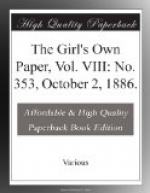“What business have you, a strong, healthy, young woman,” I observed to myself, severely, “to be a burthen on these good folk? What is enough for two may be a tight fit for three; it was that new mantle of yours, Miss Merle, that has put out the drawing-room fire for three weeks, and has shut up the sherry in the sideboard. Is it fair or right that Aunt Agatha and Uncle Keith should forego their little comforts just because an idle girl is on their hands?”
I pondered this question heavily before I summoned courage to speak to Aunt Agatha. To my surprise she listened to me very quietly, though her soft brown eyes grew a little misty—I did so love Aunt Agatha’s eyes.
“Dear,” she said, very gently, “I wish this could have been prevented; but, for my husband’s sake, I dare not throw cold water on your plan. I cannot deny that he has had a heavy loss, and that we have to be very careful. I would keep you with me if I could, Merle, for you are just like my own child, but Ezra is not young;” and here Aunt Agatha’s forehead grew puckered with anxiety.
“Oh, Aunt Agatha,” I exclaimed, quite forgetting the gravity of my proposition in sudden, childish annoyance, “how can you call Uncle Keith, Ezra? It is such a hideous name.”
“Not to my ears,” she answered, quite calmly; “a wife never thinks her husband’s name hideous. He loves to hear me say it, and I love to please him, for though you may not believe it, Merle, I think there are very few men to compare with your uncle.”
She could actually say this to my face, looking at me all the time with those honest eyes! I could not forbear a little shrug at this, but she turned the subject, placidly, but with much dignity.
“I have been a working bee all my life, and have been quite contented with my lot; if you could only follow my example, I should be perfectly willing to let you go. I have thought once or twice lately that if anything were to happen to me, you and your uncle would hardly be comfortable together; you do not study him sufficiently; you have no idea what he really is.”
I thought it better to remain silent.
Aunt Agatha sighed a little as she went on.
“I am not afraid of work for you, Merle, there is no life without activity. ‘The idle man,’ as someone observes, ’spins on his own axis in the dark.’ ‘A man of mere capacity undeveloped,’ as Emerson says, ’is only an organised daydream with a skin on it.’ Just listen to this,” opening a book that lay near her. “’Action and enjoyment are contingent upon each other. When we are unfit for work we are always incapable of pleasure; work is the wooing by which happiness is won.’”
“Yes, yes,” I returned, rather impatiently, for Aunt Agatha, with all her perfections, was too much given to proverbial and discursive philosophy; “but to reduce this to practice, what work can I do in this weary world?”
“You cannot be a governess, not even a nursery governess, Merle,” and here Aunt Agatha looked at me very gently, as though she knew her words must give me pain, and suddenly my cheeks grew hot and my eyelids drooped. Alas! I knew too well what Aunt Agatha meant; this was a sore point, the great difficulty and stumbling block of my young life.




